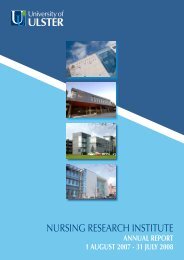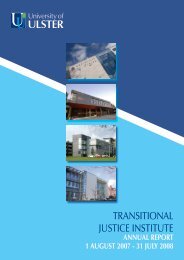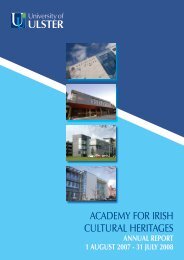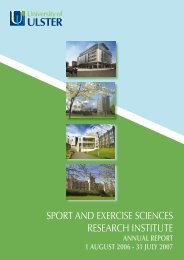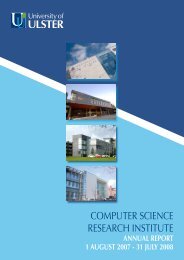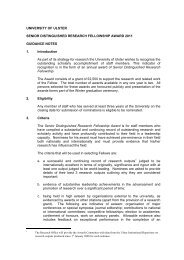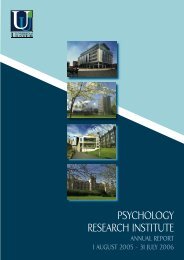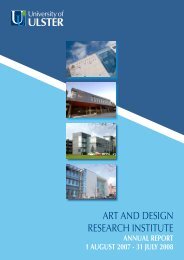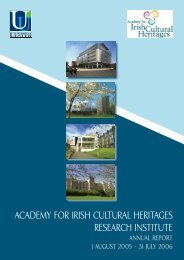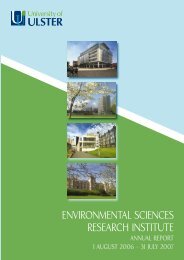biomedical sciences research institute - Research - University of Ulster
biomedical sciences research institute - Research - University of Ulster
biomedical sciences research institute - Research - University of Ulster
- No tags were found...
Create successful ePaper yourself
Turn your PDF publications into a flip-book with our unique Google optimized e-Paper software.
GROUP MEMBERSAcademic Staff:Pr<strong>of</strong>essor Ge<strong>of</strong>f McMullan, Group LeaderPr<strong>of</strong>essor <strong>of</strong> MicrobiologyContact details:T: +44 (0)28 70324755g.mcmullan@ulster.ac.ukPr<strong>of</strong>essor McMullan’s <strong>research</strong> continues to be focused upon the use <strong>of</strong> genomic information to provide a deeperunderstanding <strong>of</strong> how microorganisms function. In the past 10 years there has been a dramatic growth in theavailability <strong>of</strong> genetic data for microorganisms as a number <strong>of</strong> groups around the world have sequenced the genomes<strong>of</strong> over 500 organisms.These microorganisms include many disease-causing bacteria in addition to others exploited by the pharmaceuticaland biotechnology industries. By using this genetic information to understand how microorganisms function underdifferent conditions, such as evading the human immune system, it is possible to identify new drug targets or toidentify new products <strong>of</strong> commercial value.Pr<strong>of</strong>essor McMullan and his team have developed a range <strong>of</strong> techniques to enable the exploitation <strong>of</strong> microbialgenomic information, including a platform <strong>of</strong> techniques to study the proteins expressed within a bacterial cell at agiven time. This work has involved collaboration with leading scientists at the <strong>University</strong> <strong>of</strong> Georgia at Athens (USA)and within the company, Applied Biosystems, a life science technology provider.This strategy has allowed us Pr<strong>of</strong>essor McMullan and his team to identify cellular signaling mechanisms withina bacterium called Ochrobactrum anthropi, the cause <strong>of</strong> an increasing number <strong>of</strong> hospital acquired infections, thatcould allow this organism to resist ‘attack’ by macrophages used as part <strong>of</strong> the human response to infection (seeFigure below taken from Graham RL; Sharma MK; Ternan NG; Weatherly DB; Jackson PJ; Tarleton RL; McMullan G;A semi-quantitative GeLC-MS analysis <strong>of</strong> temporal proteome expression in the emerging nosocomial pathogenOchrobactrum anthropi.; Genome Biol.; 2007; 8, R110).57



